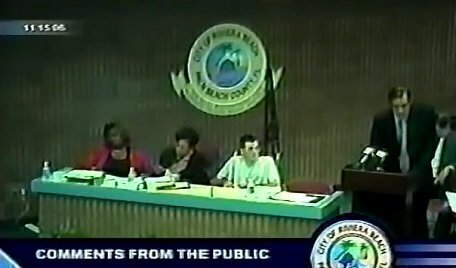It’s rare for one person to get a victory at the Supreme Court, but a South Florida man will try for a second win this spring in a case about his arrest at a public meeting more than a decade ago.
 Back in January 2013, Fane Lozman prevailed in a 7-2 decision in his appeal about his former floating home, which had been seized by Riviera Beach, Florida, and destroyed under the terms of admiralty law. Riviera Beach claimed the structure was a vessel and subject to impoundment due to overdue fees it never received.
Back in January 2013, Fane Lozman prevailed in a 7-2 decision in his appeal about his former floating home, which had been seized by Riviera Beach, Florida, and destroyed under the terms of admiralty law. Riviera Beach claimed the structure was a vessel and subject to impoundment due to overdue fees it never received.
Lozman had lost in the lower courts when he said the structure was a floating house, and not a vessel, because it wasn’t capable of moving on its own. Justice Stephen Breyer, in a colorful opinion, said the Court’s majority agreed with Lozman’s definition and overturned the lower court’s verdict.
“Not every floating structure is a ‘vessel.’ To state the obvious, a wooden washtub, a plastic dishpan, a swimming platform on pontoons, a large fishing net, a door taken off its hinges, or Pinocchio (when inside the whale) are not ‘vessels,’” Breyer said, “even if they are ‘artificial contrivance[s]’ capable of floating, moving under tow, and incidentally carrying even a fair-sized item or two when they do so.” (Note: In checking more than 200 years of Supreme Court decisions at CourtListener.com, Breyer’s opinion appears to contain the only reference to the fictional wooden character in the Court’s history of opinions.)
Lozman’s attempts to get what he felt was just compensation for the destroyed floating boat also failed in the lower court system, and the Supreme Court denied his appeal in April 2017.
But last week, the Court accepted Lozman’s appeal in a third case that goes back to November 15, 2006. Lozman previously had objected to plans made by Riviera Beach to develop property that was part of a marina where his floating house was located. He appeared at a council meeting at a public comment session to speak about government corruption at a county level.
In a scene caught on video and posted to YouTube, the Riviera Beach city council President asked Lozman to stop speaking about county-level issue, but Lozman continued speaking. The council President then summoned a police officer to the floor, who arrested Lozman after he refused to leave the public-comment session and walk outside of the room.
Two charges were filed against Lozman, but the state attorney didn’t pursue the case. Lozman then sued Riviera Beach over the arrest, claiming his First Amendment rights were violated.
At a jury trial, Riviera Beach won its case, stating that the officer had probable cause to arrest Lozman based on his actions. A federal appeals court upheld the lower court’s decision.
In their plea to the Supreme Court, Lozman’s legal team wants the Justices to settle what it feels is an unresolved issue: Does the existence of probable cause for an arrest supersede First Amendment protections from an arrest based on a person’s criticism of the government?
Lozman’s team says the Court’s 2006 decision in Hartman v. Moore said that a plaintiff must prove that probable cause didn’t exist in a case involving retaliatory prosecution that violated First Amendment protections against retaliations by the government. A second Court case, Reichle v. Howards (2012), was taken in part by the Court to settle the question about retaliatory arrests, but the Justices didn’t settle that question in their decision, they claim.
In its petition asking the Court to deny Lozman’s appeal, Riviera Beach made several arguments. One was that the officer on the scene wasn’t familiar with Lozman and his relationship with council, and he made the arrest based on his own probable cause judgment. The other broader argument was that the body and intent of the Court’s prior decisions made it clear that the precedent set in Hartman also applied to retaliatory arrests and that the existence of probable cause defeated the First Amendment claim of retaliation.
In accepting the case, at least four of the Justices voted in private conference to hear arguments in 2018.







